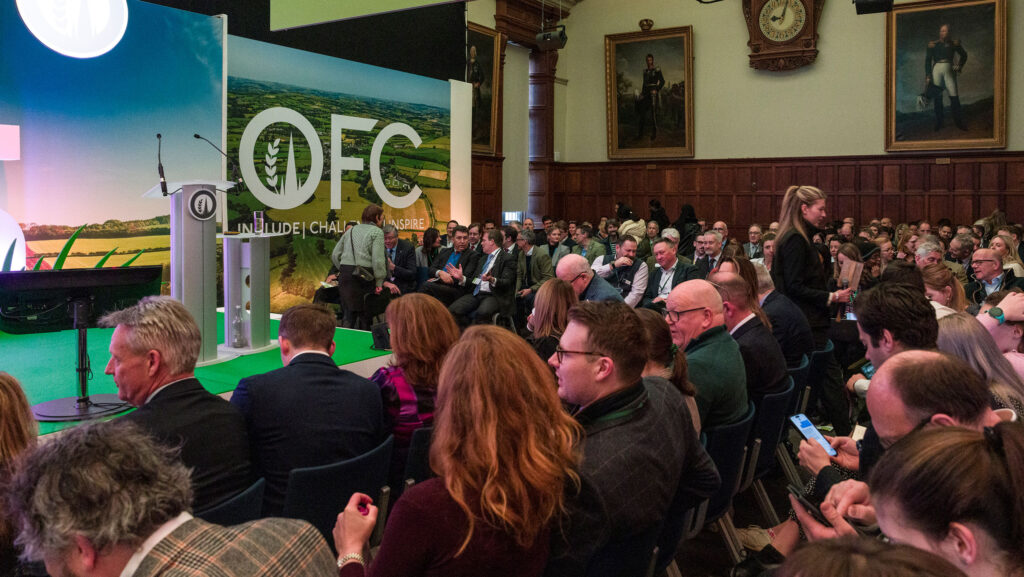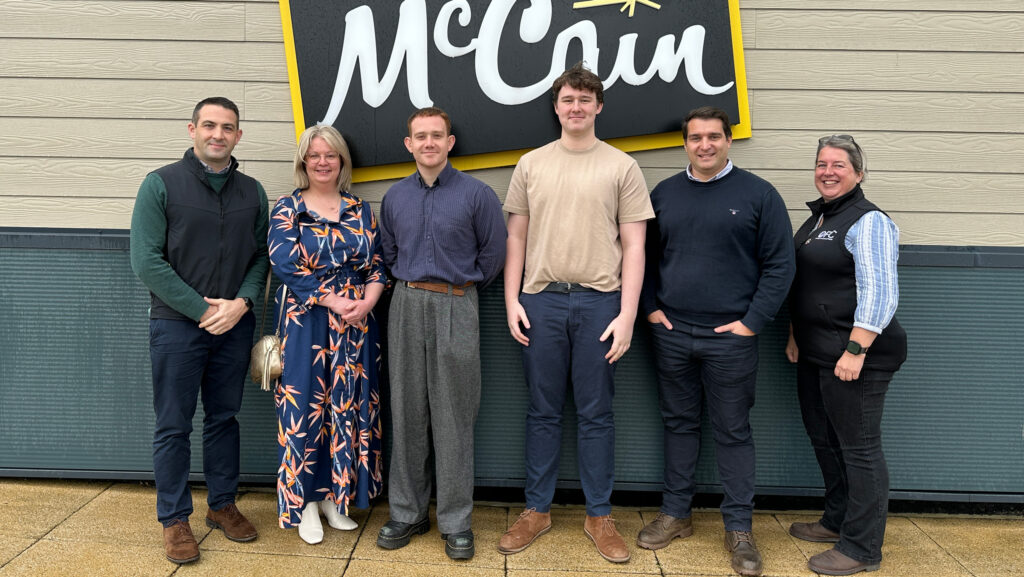Farming’s ‘next big ideas’ to take the stage at Oxford
 © Oxford Farming Conference
© Oxford Farming Conference Four emerging entrepreneurs and researchers will bring forward new thinking on how to build a stronger, more adaptable farming industry at the 2026 Oxford Farming Conference (OFC).
They make up this year’s Inspiring Innovators, a programme run by OFC in partnership with McCain Foods GB, which gives people working across food, farming and the rural economy the chance to share solutions to some of the industry’s biggest challenges.
See also: OFC 2026 to focus on farming resilience
Now in its second year, the initiative highlights new technology, research and business ideas that could help farming stay productive and profitable through change.
Each participant will present their project at the beginning of the conference to an esteemed audience of farmers, policymakers and industry leaders.

From left: James Hopwood, Helen Wyman, Thomas McVeigh, Isaac Orr, James Stretton, and OFC director Sheena Horner © OFC
1. JustFarm – simplifying subsidy management
Financial resilience is central to business success, and JustFarm, developed by James Stretton, aims to make subsidy management simpler and more efficient.
The platform uses artificial intelligence to interpret agricultural policy and turn it into a clear, map-based interface that shows what actions qualify for funding, when they are due, and what evidence is needed for compliance.
By reducing the time and complexity involved in managing schemes and identifying opportunities to combine or “stack” options, JustFarm helps farmers make better use of available support.
It’s a tool designed to bring clarity and confidence at a time of significant policy change.
James says: “Farming has always demanded resilience, but today’s challenges call for new tools and clearer guidance to help farmers navigate modern day challenges.
“At JustFarm, we’re proud to help farmers manage this complexity, keeping them compliant, organised, and confident in their business.
“Taking part in OFC26 is an opportunity to share how farmer-led innovation can make a real difference on the ground.”
2. Pneumonitor – protecting livestock and margins
In livestock farming, resilience often depends on early intervention.
Pneumonitor, developed by Isaac Orr, tackles pneumonia in calves and youngstock by monitoring the conditions that allow the disease to develop.
The in-pen sensor measures humidity, temperature and ammonia, feeding data to a dashboard that identifies when ventilation or heating needs to change.
By linking the sensor data to existing fans, heaters and side panels, the Pneumonitor Retrofit unit allows sheds to adjust automatically as conditions change.
It offers an accessible route to healthier air and fewer disease problems, without major investment or extra labour.
3. Twocan Mentor – building people power
Resilience also relies on people and leadership. Twocan Mentor, founded by Helen Wyman, is designed to connect individuals across food and farming through structured mentoring.
The programme matches mentors and mentees using behavioural insights, learning styles and personal goals rather than job titles, encouraging collaboration across traditional sector lines.
Over six months, participants follow a supported process combining in-person workshops and guided reflection.
The aim is to strengthen confidence, communication and decision-making, helping individuals and businesses adapt more effectively.
Helen says: “I’m delighted that Oxford Farming Conference 2026 and its Inspiring Innovators programme offer a stage for Twocan Mentor to bring our vision of a ‘mentorship movement built on connection, development and impact’ to life.”
4. Copperfield Enterprises – diversifying for the future
Diversification continues to play an important role in economic resilience.
Through Copperfield Enterprises, Thomas McVeigh is exploring hazelnuts as a high-value, climate-resilient tree crop for UK production.
His research points to realistic yields of up to 4t/ha and net margins of £5,000-£7,000/ha, with potential for shared processing and marketing infrastructure to create scale.
The crop’s low labour demand, long lifespan and ability to store carbon make it well suited to both commercial and environmental objectives.
By adding a new perennial crop option to the UK’s rotation, Copperfield Enterprises demonstrates how diversification can build economic strength and reduce exposure to volatile commodity markets.
Collaboration
Commenting on the partnership with OFC, James Hopwood, McCain’s director of agriculture, says: “This collaboration reflects our shared commitment to supporting visionary leaders and innovative problem-solvers.
“Together, we aim to empower UK growers, producers, and processors to advance innovation and sustainability throughout the agri-food sector.”
The Oxford Farming Conference runs from 7-9 January 2026. The Inspiring Innovators programme starts at 2pm on 7 January. To find out more and book tickets, visit ofc.org.uk
